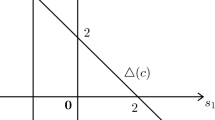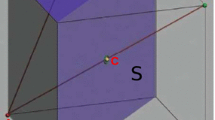Abstract
Zeuthen–Hicks bargaining provides a dynamic model that explains how two parties in a negotiation make concessions to reach the Nash bargaining solution. However, it is not clear whether this process will always reach the global optimum corresponding to the Nash bargaining solution, or could end at a local optimum, or even in disagreement. In this paper, we analyze different types of utility functions, both analytically and in a computational study, to determine under which circumstances convergence to the Nash bargaining solution will be achieved. We show that non-standard preferences, involving, e.g., reference point effects, might indeed lead to multiple local optima of the Nash bargaining objective function and thus failure of the bargaining process. This occurs more often if expectations of parties are mutually incompatible.





Similar content being viewed by others
References
Bishop RL (1964) A Zeuthen–Hicks theory of bargaining. Econometrica 32:410–417
Chatterjee K (2010) Non-cooperative bargaining theory. In: Kilgour DM, Eden C (eds) Handbook of group decision and negotiation. Springer, Dordrecht, pp 141–150 (book section 8)
Coddington A (2010) Theories of the bargaining process, Routledge Library Editions. Economics. Keynesian and Post-Keynesian Economics. Routledge, London
Crawford VP (1980) A note on the Zeuthen–Harsanyi theory of bargaining. J Confl Resolut 24(3):525–535
Dias LC, Vetschera R (2018) On generating value functions in stochastic multicriteria acceptability analysis (forthcoming)
Fandel G (1985) On the applicability of group decision-making concepts to wage bargaining. In: Haimes YY, Chankong V (eds) Decision making with multiple objectives. Springer, New York, pp 532–548
Filzmoser M, Hippmann P, Vetschera R (2016) Analyzing the multiple dimensions of negotiation processes. Group Decis Negot 25:1169–1188
Harsanyi JC (1956) Approaches to the bargaining problem before and after the theory of games: a critical discussion of Zeuthen’s, Hicks’, and Nash’s theories. Econometrica 24(2):144–157
Kahneman D, Tversky A (1979) Prospect theory: an analysis of decision under risk. Econometrica 47(2):263–291
Kersten GE, Lai H (2010) Electronic negotiations: foundations, systems, and processes. In: Eden C, Kilgour DM (eds) Handbook of group decision and negotiation. Springer, New York, pp 361–392 (book section 21)
Kíbris O (2010) Cooperative game theory approaches to negotiation. In: Kilgour DM, Eden C (eds) Handbook of group decision and negotiation. Springer, Dordrecht, pp 151–166 (book section 9)
Kilgour DM, Eden C (2010) Introduction to the handbook of group decision and negotiation. In: Kilgour DM, Eden C (eds) Handbook of group decision and negotiation. Springer, Dordrecht, pp 1–7
Nash JF (1950) The bargaining problem. Econometrica 18(2):155–162
Pennings JME, Smidts A (2003) The shape of utility functions and organizational behavior. Manag Sci 49(9):1251–1263
Rieger MO, Wang M, Hens T (2015) Risk preferences around the world. Manag Sci 61(3):637–648
Rubinstein A (1982) Perfect equilibrium in a bargaining model. Econometrica 50(1):97–109
Saraydar E (1971) Uncertainty, the bargaining problem, and the Nash–Zeuthen solution. Theory Decis 1(3):309–319
Schoemaker PJ (1990) Are risk-attitudes related across domains and response modes. Manag Sci 36(12):1451–1463
Sutton J (1986) Non-cooperative bargaining theory: an introduction. Rev Econ Stud 53(5):709–724
Thompson W (1994) Cooperative models of bargaining. In: Aumann RJ, Hart S (eds) Handbook of game theory with economic applications, vol II. Elsevier, Amsterdam, pp 1238–1284
Vetschera R (2006) Preference structures of negotiators and negotiation outcomes. Group Decis Negot 15:111–125
Vetschera R (2007) Preference structures and negotiator behavior in electronic negotiations. Decis Support Syst 44(1):135–146
Vetschera R (2013) Negotiation processes: an integrated perspective. Eur J Decis Process 1(1–2):135–164
Wagner RH (1979) On the unification of two-person bargaining theory. J Confl Resolut 23(1):71–101
Acknowledgements
We thank three anonymous reviewers for their helpful comments that contributed to improving the paper.
Author information
Authors and Affiliations
Corresponding author
Rights and permissions
About this article
Cite this article
Dias, L.C., Vetschera, R. Multiple local optima in Zeuthen–Hicks bargaining: an analysis of different preference models. EURO J Decis Process 7, 33–53 (2019). https://doi.org/10.1007/s40070-018-0089-0
Received:
Accepted:
Published:
Issue Date:
DOI: https://doi.org/10.1007/s40070-018-0089-0




